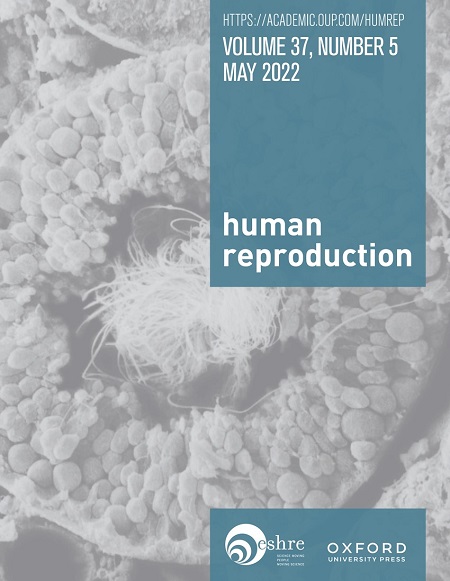O-177 Fertility literacy in action: design and pilot results from the facts! Serious game in Europe
IF 6
1区 医学
Q1 OBSTETRICS & GYNECOLOGY
引用次数: 0
Abstract
With increasing infertility rates and the global trend toward delayed parenthood, fertility education is becoming an essential tool to support informed reproductive decision-making. Adolescence represents a critical period for promoting fertility awareness and fostering healthier reproductive trajectories over the life course. To improve fertility literacy among young people, Fertility Europe and associated researchers developed Facts!—an online serious game (https://myfacts.eu/) designed for adolescents. The game features nine questions focused on fertility-related topics, including the probability of conceiving, the definition of infertility, and modifiable risk factors such as age, smoking, alcohol consumption, drug use, and physical activity. The game’s interactive format allowed participants to accumulate stars for correct answers while progressing through four virtual scenarios. In collaboration with national patient associations affiliated with Fertility Europe, the game was promoted through social media and in-school campaigns, including direct outreach in secondary schools. Data were collected between July 2023 and November 2024 in Bulgaria, Norway, Poland, and Portugal. Adolescents aged 15 to 18 were invited to participate. Of the 4,648 who completed the game, 3,555 were eligible for analysis. This pilot study analyzed differences in fertility knowledge by country, gender, and age, as well as predictors of awareness in three core domains: infertility diagnosis, probability of conception, and age-related fertility decline. The narratives of adolescents, parents and teachers about the utility of this tool and its educational potential were also addressed using focus groups. Serious games like Facts! offer a promising, scalable approach to reproductive health education, delivering evidence-based content in a format that resonates with young audiences. Preliminary findings demonstrate that Facts! effectively engages adolescents and improves their understanding of fertility. Participants, parents, and teachers responded positively, highlighting the tool’s accessibility, educational value, and ability to spark meaningful discussions on reproductive health in both formal and informal settings. These findings support the integration of fertility awareness into broader health and education strategies, with the goal of equipping adolescents with the knowledge they need to make informed decisions about their reproductive futures.O-177行动中的生育素养:设计和试点结果来自事实!欧洲的严肃游戏
随着不孕不育率的上升和延迟生育的全球趋势,生育教育正在成为支持知情生殖决策的重要工具。青春期是提高生育意识和在一生中培养更健康的生殖轨迹的关键时期。为了提高年轻人的生育素养,欧洲生育中心和相关研究人员开发了《事实!》-专为青少年设计的网络严肃游戏(https://myfacts.eu/)。这款游戏的九个问题都与生育有关,包括怀孕的可能性、不孕的定义,以及年龄、吸烟、饮酒、吸毒和体育锻炼等可改变的风险因素。游戏的互动形式允许参与者在通过四个虚拟场景的同时,为正确答案累积星星。该游戏与隶属于欧洲生育协会的国家患者协会合作,通过社交媒体和校内活动进行推广,包括在中学进行直接宣传。数据于2023年7月至2024年11月在保加利亚、挪威、波兰和葡萄牙收集。15至18岁的青少年被邀请参加。在完成游戏的4,648人中,有3,555人有资格进行分析。这项试点研究分析了国家、性别和年龄在生育知识方面的差异,以及三个核心领域的认知预测因素:不孕症诊断、受孕概率和与年龄相关的生育率下降。还利用焦点小组讨论了青少年、家长和教师关于这一工具的用途及其教育潜力的叙述。像《Facts!》提供一种有前途的、可扩展的生殖健康教育方法,以能引起年轻受众共鸣的形式提供循证内容。初步调查结果表明,事实!有效地吸引青少年并提高他们对生育的了解。参与者、家长和教师的反应积极,强调该工具的可获得性、教育价值以及能够在正式和非正式环境中引发有关生殖健康的有意义的讨论。这些发现支持将生育意识纳入更广泛的保健和教育战略,其目标是使青少年掌握必要的知识,以便就其生育未来作出知情决定。
本文章由计算机程序翻译,如有差异,请以英文原文为准。
求助全文
约1分钟内获得全文
求助全文
来源期刊

Human reproduction
医学-妇产科学
CiteScore
10.90
自引率
6.60%
发文量
1369
审稿时长
1 months
期刊介绍:
Human Reproduction features full-length, peer-reviewed papers reporting original research, concise clinical case reports, as well as opinions and debates on topical issues.
Papers published cover the clinical science and medical aspects of reproductive physiology, pathology and endocrinology; including andrology, gonad function, gametogenesis, fertilization, embryo development, implantation, early pregnancy, genetics, genetic diagnosis, oncology, infectious disease, surgery, contraception, infertility treatment, psychology, ethics and social issues.
 求助内容:
求助内容: 应助结果提醒方式:
应助结果提醒方式:


